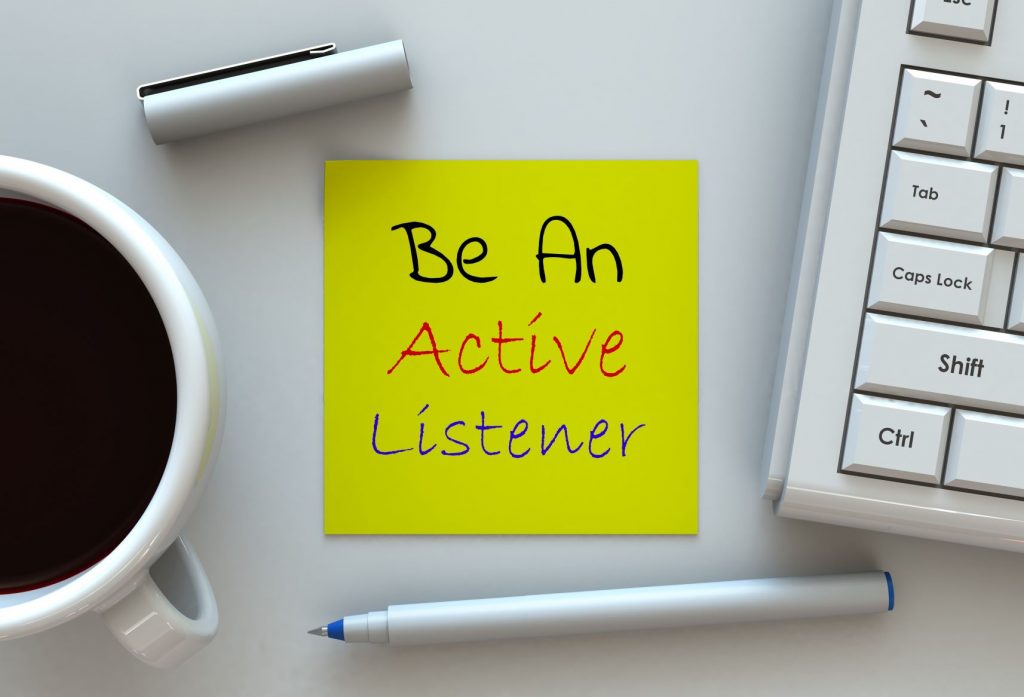Leadership Qualities – Fundamental steps to improve anyone’s listening skills:

Hearing someone talk does not mean you are listening. Like many other leadership qualities, effective listening is a learned skill. Listening requires patience and understanding. On some occasions, listening may also entail empathy. You should always have the intention to have a better understanding of a person, idea, or situation when listening. Just as there are numerous ways to learn, there are also many different ways to listen to a person. Listening skills should be applied appropriately and consciously. In your personal and professional life, you will encounter diverse personalities, distinct scenarios, and different needs; which will demand different approaches to the way you listen.
Listening is divided into three vital aspects: perception, reception, and attention. Madelyn Burley-Allen, the author of “Listening: The Forgotten Skill,” explained listening is incredibly subjective. “When we expect to hear certain things, we don’t listen to what is really said… We sometimes only pay attention to what interests us or what we like about the talker,” Burley-Allen said. “On the other hand, the more we are receptive to people or to their point of view because of our positive perceptions, the more we will pay attention to what they say.” On the contrary, individuals can develop a negative habit of not listening to others just because they do not agree with them or do not understand where they are coming from. However, this is not the only contribution to poor listening. Infinite reasons can create a bad listener. In most scenarios, people are unaware of their inadequate listening patterns.
Effective listening serves as a powerful business and leadership quality. Being a good listener will not only benefit you as a professional and leader, but it can also make you a better person. Here are some simple tips to prevent poor listening skills, improve the way you listen to others and overall better your leadership qualities.
- Don’t be biased.
“Listening without bias or distraction is the greatest value you can pay another person.”
One of the major listening blocks occurs when others have preconceived opinions. These opinions can deem the value of the conversation as unimportant, too boring, or too complex. When listening to others in your workplace or personal life, always have an open mind. One of the most discouraging aspects of speaking to others is fear of rejection or being ignored. Listening is the key ingredient for discovering new insights and solving problems.
- Silence is golden.
“Most people do not listen with the intent to understand; they listen with the intent to reply.”
Your listening skills can be improved when you talk less. Talking less when interacting with others give you the opportunity to make more observations — not just with yourself, but with your peers. Refrain from the need to always reply in group conversations, unless it directly involves you. Also, keep in mind replies can be nonverbal, whether it is body language or simply nodding your head and maintaining eye contact.
 3. Listening holds just as much power as speaking.
3. Listening holds just as much power as speaking.
“There is as much wisdom in listening as there is in speaking–and that goes for all relationships…”
— Daniel Dae Kim
As a professional, you may feel obligated to perfect your public speaking skills. However, how much time do you spend trying to improve your listening skills? You can’t always personalize the way you listen, but choosing to adjust your listening habits to those closest to you will create better results in the long run. Leaders don’t just recognize good speakers, they also notice great listeners.
- Acknowledge your style of listening.
“Most of the successful people I’ve known are the ones who do more listening than talking.”
— Bernard Baruch
According to Burley-Allen, there are five common styles of listening that can take a toll on any conversation. These styles are categorized as the faker, dependent listener, interrupter, self-conscious listener, and the intellectual/logical listener. Once you are aware of your listening habits, you will find it easier to make strides for improvement. Always try to find a balance between listening and speaking. Even if you already consider yourself a good listener, think about other areas you would like to develop to improve your interactions with others.





